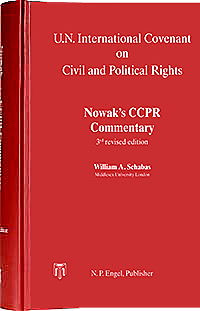
William A. Schabas
Nowak’s CCPR Commentary 3rd revised edition
Commentary on the U.N. International Covenant on Civil and Political Rights
Nowak’s CCPR Commentary 3rd revised edition
Commentary on the U.N. International Covenant on Civil and Political Rights
XXVI, 1,172 pages, hardcover • ISBN 978-3-88357-159-1 • 2019 • US$ 304; € 268; £240; SFr. 298
Students providing proof of their status: less 50 %
Diese E-Mail-Adresse ist vor Spambots geschützt! Zur Anzeige muss JavaScript eingeschaltet sein!
Bank details for direct transfer of funds
Students providing proof of their status: less 50 %
Please send your order to N. P. Engel, Publisher, using the following email address:
Diese E-Mail-Adresse ist vor Spambots geschützt! Zur Anzeige muss JavaScript eingeschaltet sein!
Bank details for direct transfer of funds
- One author who writes it all – An outstanding achievement.
The publisher proudly presents the author William Schabas who agreed to continue Manfred Nowak’s CCPR Commentary (1st and 2nd ed., published in 1993 and 2005, respectively).
- The Covenant rights are human rights in a triple sense
– In contrast to fundamental rights at the domestic level, they have been created directly by international law; – With the exception of the citizens‘ rights guaranteed by Art. 25, they apply to all persons, i.e., to aliens as well; – With the exception of the right of self-determination in Art. 1, which is exclusively conceived of as a right of peoples, they are human rights of individuals.
- The wealth of material, some basic figures
Individual communications
116 States worldwide accept the individual petition procedure under the first Optional Protocol to the Covenant (OP1): the Human Rights Committee has considered over the last 40 years (1977-2018) close to 3,000 communications. Of these, the Committee has adopted final decisions, labelled “Views”, in 1,200 cases, finding a violation in 994 of them. In recent years the Committee had in the order of 600 communications pending review at any one time. Examination of State reports
Altogether 172 States (including inter alia India, Syrian Arab. Rep., Thailand and USA which are not bound by OP1) have ratified the Covenant and thus accepted the immediate obligation to respect the rights recognized therein and to be subjected to the State report procedure (Art. 40 CCPR). The practice of the Human Rights Committee in examining State reports has evolved as a constant process of trial and error and of adaptation to changing needs and requirements. The current Guidelines indicate specific issues that States should address. For example, under Art. 6 (right to life) they are asked for information about cases of enforced disappearances, the use of force and firearms in law enforcement and matters concerning women including prevention of unwanted pregnancies and honour killings.
The Committee has examined hundreds of State reports and adopted 36 General Comments (as at 1 January 2019).
- Structure and methodology
The Commentary proceeds article by article, with paragraph numbers, in order to facilitate the quickest reference to specific problems. Thus, Arts. 1-53 of the CCPR and Arts. 1-14 of the first Optional Protocol relating to the individual communications procedure are analyzed as well as Arts. 1-11 of the Second Optional Protocol (which entered into force on 11 July 1991, 86 ratifications as at 1 January 2019 – abolition of the death penalty).
- Comparative law elements The reader’s attention is – whenever appropriate – drawn to other international conventions (universal and regional) and the case law of the respective organs, especially to the European Convention on Human Rights and the ECtHR.
- To improve research
A detailed index of keywords is available; A separate case index includes all cases cited; Moreover: Table of ratifications; List of acting and former Committee members; List of General Comments.
- The Author
William A. Schabas is professor of international law at Middlesex University London and professor of international criminal law and human rights at Leiden University. Originally from Canada, he was a professor of law and director of the law school at the Université du Québec à Montréal. In 2000, he moved to Ireland to serve as director of the Irish Centre for Human Rights. Professor Schabas is the author of many books and articles in the field of human rights, including The Abolition of the Death Penalty in International Law, Genocide in International Law, and commentaries on the Rome Statute of the International Criminal Court and the European Convention on Human Rights. He was a member of the Sierra Leone Truth and Reconciliation Commission and chairman of the United Nations Commission of Inquiry into the 2014 Gaza conflict. He is an Officer of the Order of Canada and a Member of the Royal Irish Academy, and holds several honorary doctorates.
 Frowein / Peukert 4. Aufl. EMRK-Kommentar
Frowein / Peukert 4. Aufl. EMRK-Kommentar